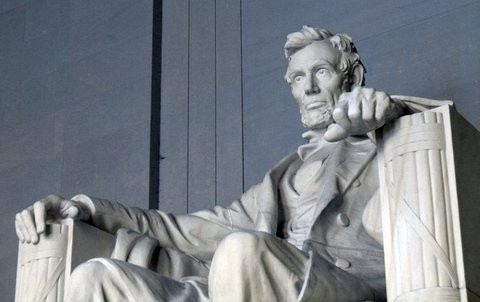
The Tyrant who is Obama's Role Model
Jan von FLOCKEN
Ex: http://www.counter-currents.com/
Translated by Greg Johnson
When Barack Obama was officially inaugurated as President of the United States, the ceremony was charged with symbolism. The figure of Abraham Lincoln, assassinated in 1865, seemed omnipresent. Remember that 2009 is the 200th anniversary of the birth of Lincoln, who has become a kind of patron saint of Western democracy. Obama was not merely content to retrace Lincoln’s route, in the spring of 1861, departing from Philadelphia, passing through Baltimore, to arrive at the White House in Washinghton D.C. When he took the oath of office, Obama also insisted on placing his hand on the 156 year old velvet-covered Bible that “Old Abe” had used, swearing “to preserve, protect and defend the Constitution of the United States.”
No one, though, has violated the Constitution more than Lincoln . . .
These attempts to draw parallels between the legendary statesman and the young president who is now America’s new hope, inadvertently stirred up all sorts of uncomfortable memories. Indeed, no President of the United States in the last 220 years has violated the Constitution and suppressed the basic rights of citizens more than Lincoln. His mandate was deployed under the bloody banner of a civil war between the Northern and Southern states. The latter left the Union in 1860–61 and founded their own state, the Confederacy. The American Constitution by no means prohibited secession of this type since it was only in 1868 that the Supreme Court ruled to the contrary. Initially, the two parties accepted the secession of the South. Thus it was that Horace Greeley, the influential editor of the New York Tribune and political friend of Lincoln, wrote in his newspaper, on November 9th, 1860: “I hope we will never have to live in a Republic maintained by bayonets.”
But it was these very bayonets that Lincoln used shortly after taking office. He seized the first excuse he found: in fact, an exchange of fire around Fort Sumter, which actually belonged to the Confederacy. This incident, which caused only some slight injuries, was used as pretext for a de facto declaration of war against the South, namely an appeal for 75,000 volunteers on April 15th, 1861. Lincoln then ordered an economic embargo against the Confederacy. The appeal and embargo were two serious political errors because they prompted the immediate secession of four hitherto neutral states: Virginia, Arkansas, North Carolina, and Tennessee.
In Maryland—which, by tradition, leaned toward the Confederacy, but which was to remain in the Union because of its proximity to Washington, D.C.—the population protested en masse against Lincoln’s warmongering. Lincoln immediately suspended the Constitutional principle of “Habeas Corpus” which protects the citizen from arbitrary arrest and guarantees his right to be heard by a judge within a short time. Annapolis, the capital of Maryland, and Baltimore, where Barack Obama went to follow Lincoln’s footsteps, were placed under martial law. On May 13th, 1861, the mayor of Baltimore, the chief of police, and all the members of the city council, were arrested, without any legal pretext, and were imprisoned until the end of the war in 1865. Ironically, among these political prisoners was the grandson of Francis Scott Key, who had composed the American national anthem, which sings the praises of “the land of the free and the home of the brave.”
When the Maryland legislature condemned these illegal and tyrannical actions, Lincoln immediately arrested 31 legislators, who were imprisoned from three to six months without trial. This forceful action clearly violated the sixth amendment to the Constitution, according to which any defendant is entitled to an immediate public trial by an independent jury. The Chief Justice of the Supreme Court, Roger B. Taney, the man before whom Lincoln had officially sworn his oath on the Bible, ordered the President make null and void these arrests because they too obviously violated the principles of the Constitution. The President had arrogated powers that are the sole prerogative of Congress. Following the admonitions of Roger B. Taney, Lincoln issued an order encouraging all public authorities to purely and simply ignore the judgment of the Supreme Court, which itself constitutes, obviously, a manifest violation of the Constitution. One observer, otherwise favorable to Lincoln, the German democrat Otto von Corvin, correspondent of the Times, noted at the time that Lincoln’s antics reminded him of a “village schoolmaster.”
In the course of the war, there were other infringements of the Constitution. The most notable of these occurred in June 1863, when Virginia was partially occupied by Northern soldiers, and a new state, West Virginia, was proclaimed, in violation of the Constitution’s stipulation that no new state can be created or established out of the territory of another.
All these assaults on the Constitution are excused today under pretext that Lincoln liberated the slaves. However, in the summer of 1862, a half year before the official proclamation of their emancipation, the President still held that: “If I could save the Union, without having to free even one slave, I would do it.”
Maintaining the Union eventually cost the lives of 600,000 people.
Americans should hope that in the future, Obama will be satisfied to imitate Lincoln only on festive occasions. For let us not forget that shortly after taking office in January, Obama said: “My politics consists in not having politics.”
Originally published in German in Junge Freiheit, no. 16, 2009




 del.icio.us
del.icio.us
 Digg
Digg
Les commentaires sont fermés.